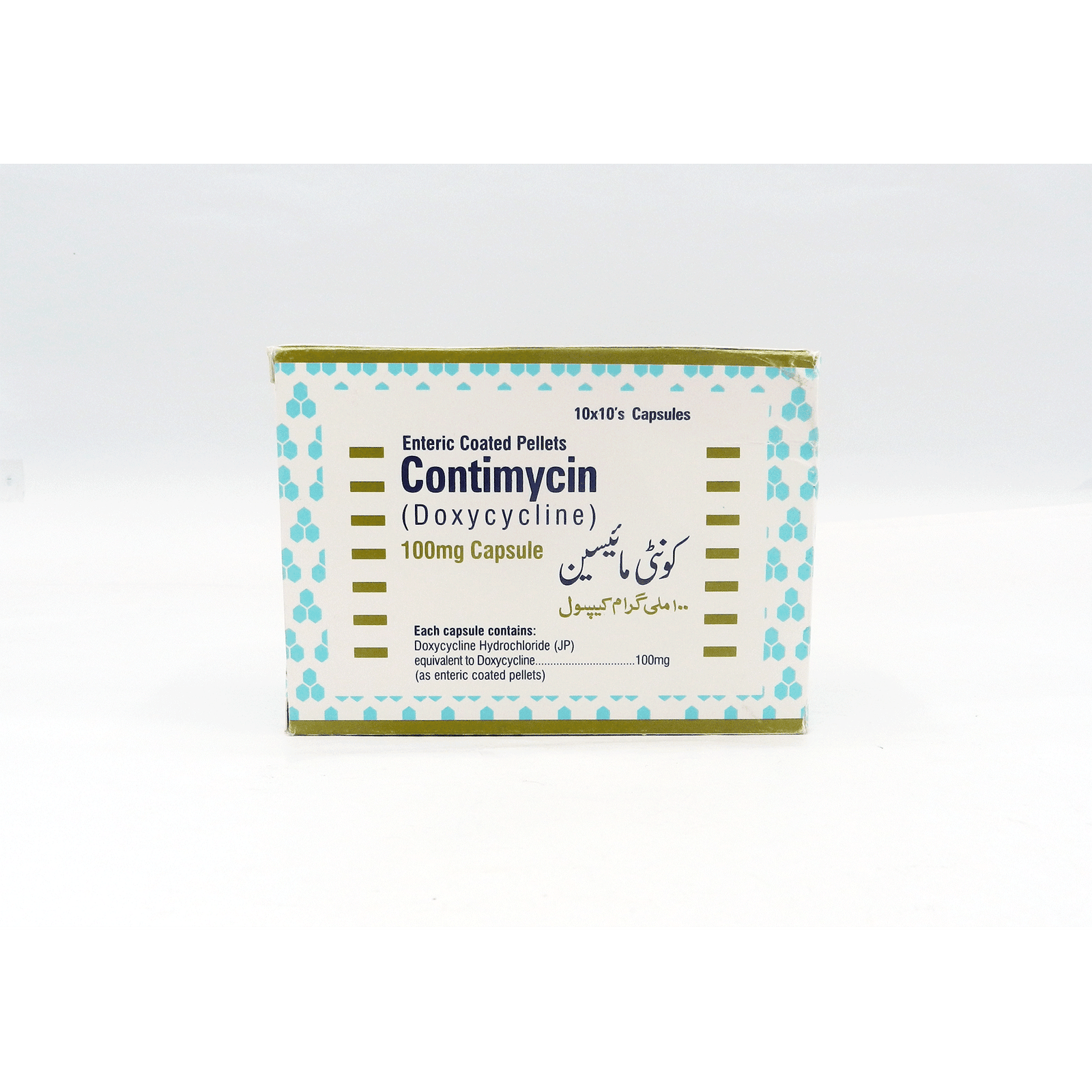delivery within 72 Hours
Contimycin Capsule
₨ 845
Generic: Doxycycline
Pack Size: 100s
Product Form: Capsule
Delivery within: 2 to 3 working days across Pakistan
Brand: ASIAN CONTINENTAL
Shipping & Delivery
-
Courier delivery
Our courier will deliver to the specified address
2-3 Days
From Rs 250
-
Free 15-Day returns

Unbeatable offers
Black Friday Blowout!
Description
Contimycin Capsule contains Doxycycline, a broad-spectrum antibiotic belonging to the tetracycline class. Doxycycline is derived from oxytetracycline and is effective against a wide range of bacteria, including both gram-positive and gram-negative organisms, as well as certain atypical bacteria and parasites. It works by inhibiting bacterial protein synthesis, thereby exerting bacteriostatic effects.
Uses:
- Contimycin Capsule is prescribed for the treatment of various bacterial infections, including respiratory tract infections (such as pneumonia, bronchitis), urinary tract infections, skin and soft tissue infections, sexually transmitted infections (such as chlamydia, gonorrhea), and certain types of acne.
- It is also used as prophylaxis for malaria and in the treatment of certain tick-borne diseases, such as Lyme disease and Rocky Mountain spotted fever.
How It Works:
- Doxycycline inhibits bacterial protein synthesis by binding to the 30S ribosomal subunit, thereby preventing the attachment of aminoacyl-tRNA to the mRNA-ribosome complex.
- This interference with protein synthesis disrupts bacterial growth and replication, ultimately leading to bacterial cell death or inhibition of bacterial multiplication.
- Doxycycline’s broad-spectrum activity and ability to penetrate various tissues make it effective against a wide range of bacterial pathogens.
Dosage:
- The dosage of Contimycin Capsule may vary depending on the type and severity of the infection, as well as the patient’s age, weight, and renal function.
- It is usually taken orally with a full glass of water, preferably on an empty stomach, at least 1 hour before or 2 hours after meals, to enhance absorption and minimize gastrointestinal side effects.
- The typical adult dose for most infections ranges from 100 mg to 200 mg once daily or in divided doses, depending on the severity of the infection.
Precautions:
- Contimycin Capsule should be used cautiously in patients with liver impairment, renal insufficiency, or a history of photosensitivity reactions.
- Patients should be advised to avoid prolonged exposure to sunlight or artificial UV light while taking Doxycycline, as it may increase the risk of photosensitivity reactions.
- Use of Doxycycline during pregnancy, especially during the second and third trimesters, should be carefully weighed against the potential risks to the fetus, as it may affect tooth and bone development in the unborn baby.
Side Effects:
- Common side effects of Contimycin Capsule may include gastrointestinal upset (such as nausea, vomiting, diarrhea, or abdominal pain), photosensitivity reactions (sunburn-like rash), and vaginal yeast infections.
- Less commonly, patients may experience allergic reactions (such as rash, itching, or swelling), dizziness, headache, or oral candidiasis (thrush).
When Not to Use:
- Contimycin Capsule is contraindicated in patients with a known hypersensitivity to Doxycycline, other tetracyclines, or any of the inactive ingredients in the formulation.
- It should not be used in children under 8 years of age or in pregnant or breastfeeding women unless the potential benefits outweigh the risks.
FAQ:
- How long does it take for Contimycin Capsule to work? The onset of action of Doxycycline may vary depending on the type and severity of the infection. Improvement in symptoms is usually observed within a few days of starting treatment, but the full course of antibiotics should be completed as prescribed.
- Can Contimycin Capsule be taken with dairy products or antacids? Dairy products, calcium supplements, and antacids containing aluminum, magnesium, or calcium may interfere with the absorption of Doxycycline. It is recommended to avoid taking these products within 2 hours before or after taking the medication.
- Is Contimycin Capsule effective against viral infections, such as the common cold or flu? No, Contimycin Capsule is only effective against bacterial infections and should not be used to treat viral infections such as the common cold or flu.
Customer Reviews
Rated 0 out of 5
0 reviews
Rated 5 out of 5
0
Rated 4 out of 5
0
Rated 3 out of 5
0
Rated 2 out of 5
0
Rated 1 out of 5
0
Be the first to review “Contimycin Capsule” Cancel reply
You must be logged in to post a review.










Reviews
Clear filtersThere are no reviews yet.